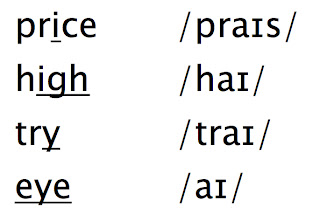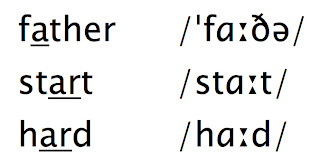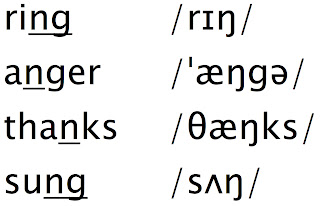Este blog ha sido creado para ayudar a los alumnos de inglés del nivel Básico 2 de Escuela Oficial de Idiomas (A2 del Marco Común Europeo) a aprender inglés y estudiar de forma autónoma online.
Showing posts with label pronunciation. Show all posts
Showing posts with label pronunciation. Show all posts
Thursday, 23 April 2015
Thursday, 12 February 2015
Pronunciation /j/
The usual spelling for this sound is the letter "y" or the initial "u".
Watch the video to practise your pronunciation.
Pronunciation / /dʒ/
The usual spelling for this sound are the letter "j" and the consonant cluster "dge", but it can also be found with the letter "g".
Watch the video to practise your pronunciation.
Wednesday, 3 December 2014
Sentence Stress (2)
The other day we practised sentence stress and we used this conversation as an example.
A: Where were you at six o'clock in the evening?
B: I was at work.
A: What were you doing?
B: I was having a meeting with the boss.
Keep practising at home and remember to pay attention to intonation and rhythm. Try to apply the rules to other conversations and think about it when you practise speaking in class.
If you want to know more about sentence stress go to my previous post
A: Where were you at six o'clock in the evening?
B: I was at work.
A: What were you doing?
B: I was having a meeting with the boss.
Keep practising at home and remember to pay attention to intonation and rhythm. Try to apply the rules to other conversations and think about it when you practise speaking in class.
If you want to know more about sentence stress go to my previous post
Tuesday, 28 October 2014
Tuesday, 7 October 2014
Pronunciation: vowel sounds
Pronunciation /əʊ/
The diphthong /əʊ/ is a very common sound in English, it's easy to pronounce. It's usual spelling is -o- as in open, -oa- as in coat, but you can also find it in words like snow or although.
Some examples are:
Watch the video and practise your pronunciation.
Pronunciation /ai/
Pronunciation /ei/
Pronunciation /e/
Pronunciation /i:/
Pronunciation /u:/
Pronunciation /ɑ:/
Sentence Stress
INTONATION, STRESS & RHYTHM
Using the right intonation or tone helps you to sound friendly and interested when you speak English. Stressing the right words in a sentence helps you speak with a good rhythm.
Intonation + stress = the music and rhythm of English.
Which words do I have to stress when I speak English?
Because we said that "stressing the right words in a sentence helps you speak with a good rhythm" you can guess that there are some words that need to be stressed some others that don't.
There are some general rules that can help you. We usually stress:
- Content words: those words which carry the meaning of the sentence (nouns, verbs, adjectives)
- Words containing important information: in a negative sentence the negative adverb is crucial and therefore it will be stressed.
- Words providing new information: words bringing new information to the topic will be stressed due to their relevance.
On some other occasions we can stress words that would not normally be stressed if we want to point out a different meaning or to put the emphasis somewhere different.
Have a look at the three videos below and practise with the exercises proposed:
Monday, 2 December 2013
Connected Speech (1)
When native speakers of English speak they connect words and sometimes you can't recognize them because several words sound just like one word.
In order to be able to recognize connections when listening you have to be aware of them and you have to use them also to make them active in your mind.
Watch the video to listen to some examples.
Now practise with the sentences you worked on in class and pay attention to connected speech as well as sentence stress.
1. What are you going to do tonight?
2. Are you going to see a film?
3. I'm going to cook a meal for you.
4. I think it's going to rain.
5. We aren't going to have a holiday this year.
Monday, 11 November 2013
Vowels sounds: /3:/
Practise the sound /3:/
 Some examples are nurse, stir, learn, refer...
Some examples are nurse, stir, learn, refer...Watch this video from the BBC, it will help you with your pronunciation
Now practise saying the sentences.
Shirley is a nurse.
I don't work on Thursdays.
I prefer a good Turkish meal.
My shirt is dirty.
Journalists work all over the world.
vowel sounds /ə/
Friday, 30 August 2013
Pronunciation: linking words
When award ends in a consonant sound and the next word begins with the same or a very similar sound, we often link the words together and only make the consonant sound once. This happens when a verb ends in /t/ or /d/, so want to is pronounced /'wɒntə/ and decided to is pronounced /dɪ'saɪdɪ
tə/.
In these cases the word "to" is not stressed and therefore it is pronounced with a schwa /tə/
tə/.
In these cases the word "to" is not stressed and therefore it is pronounced with a schwa /tə/
Wednesday, 26 June 2013
Pronunciation: /ŋ/
Subscribe to:
Comments (Atom)





















